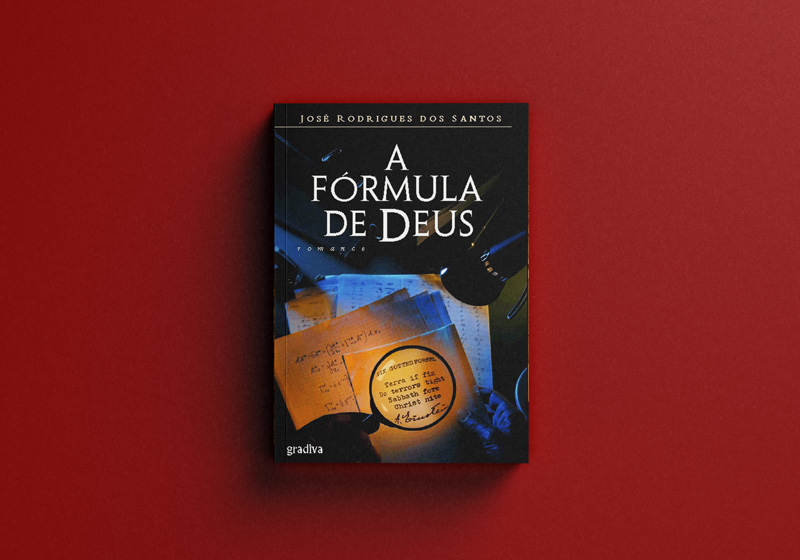Interview Diário de Notícias
- This novel is clearly written for the international market. Isn’t Portugal big enough for you?
JRS: This is a book about a fundamental quest in human condition: the existence of God and the role of mankind in the universe. This is obviously a universal problem, not a Portuguese one. This is not a book written specifically for the international market, but, due to its subject, it may be of interest to anyone, regardless of nationality, culture, ethnic background or religion.
- Despite Portugal being one of the countries where the action takes place, the novel is also set in newsworthy places, such as Egypt, Iran and Tibet. Why is that?
JRS: Perhaps because I enjoy travelling and I try to take my readers with me. Travel is something you find in all my novels. The Island of Darkness takes place in East Timor, Indonesia, Portugal, Norway, Thailand, the Philippines and Belgium; The Captain’s Daughter is set in Portugal, France and Germany. I just want to take my readers along with me on my travels.
- Are you influenced by subjects that became important after September 11th, such as terrorism?
JRS: Not too much. But it may be that sometimes world crisis entangle with my stories. That clearly happens in The Einstein Enigma with the Iranian nuclear crisis.
- Do you believe in the nuclear crisis hypothesis presented by the novel?
JRS: It’s a possible scenario. North Korea kept saying for years that it only wanted nuclear energy for peaceful purposes and look what happened.
- In The Einstein Enigma you present Lisbon as an international platform for espionage and secret agents, very much like in books and movies about the Second World War. Is this only fiction?
JRS: Of course it is. But one of the novel’s characters, Greg Sullivan, is based on a real person, an American I met at the US Embassy in Lisbon. He had a very quiet and detached look, and I believe now he really was a CIA man.
- Why did you decide to stop writing about the past and became focused in current issues?
JRS: I’m not an historical fiction author, I’m a storyteller. I try to be a novelist who tries different narrative techniques, using history, science, art, politics and whatever else that belongs to the human experience as raw material for my stories. What is important to me is that the novel is interesting and readable. It may be a story from history, it may be an espionage thriller, it may be a love story. What’s important is that it must be well told.
- How do you feel as the most prolific Portuguese author nowadays?
JRS: Let us not exaggerate. I only wrote four novels up until now. But it’s true that I have five or six more in my mind.
- How long do you take to research and write?
JRS: I research and write very quickly, as a result of my academic and journalistic experience. If I wasn’t so lazy, I could publish two novels a year.
- Do you need to believe in what you write or it’s just the need to tell a story?
JRS: I need to believe in whatever I do.
- The journalist and the writer share the same opinion about The Einstein Enigma?
JRS: Of course, because it’s not the mind of the novelist or the journalist that you find here, it’s the mind of a human being. This book tries to answer a fundamental question: is it possible to scientifically prove God’s existence? What I did was to try to find out what science’s answer to this question is. And I found a surprising answer. I found that science is closer to the mystery than we know. There are specific answers and they are fully explained in the novel.
- Does the journalist in you conflict with the writer in you?
JRS: Very much to the contrary. There is a lot of journalism in my writing. Like most journalists, I write to be understood and that is a dominant trait of my novels. No reader can complain that I write in a difficult manner or that I do not respect grammar. The amount of text I write is what’s necessary and sufficient for the story to work as a whole.
- Portuguese readers do not usually digest 500 page novels written by the same author. What makes you the obvious exception?
JRS: I think the answer can only be given by each person who reads my books. What makes 155 000 people buy Codex 632 and 90 000 buy The Captain’s Daughter? The answer is simple: none seemed big when read. A 50 page book can be enormous if it’s boring and a 1000 page book can be small if extremely interesting. What makes a book interesting or boring is not the number of pages, it’s the way it’s written.
- With The Einstein Enigma you will definitely be known as the Portuguese Dan Brown.
JRS: I find that comparison unfair since my novel does not even involve historical mysteries. Mine is a book about the existence of God and the meaning of life. These are not Dan Brown subjects. But if you insist in comparing me with him, so be it. I just don’t care.
- Is the main character of your novel, Thomas, an autobiographic character?
JRS: Nope. Thomas is fictional. But it’s obvious that we always put something of ourselves in some characters, especially in what they say.
- In all your novels there is a romantic couple. Can a book live without a love story?
JRS: There are many novels without love stories, but it’s true that I always try to put one in my books. You see, if I want to create multidimensional characters, this is an unavoidable dimension. Love is part of life. Human beings are driven by the search for love and sex. How could I create believable characters if they were not driven by normal motivations?
- Do you think that an historian, even considering that he is a cryptanalyst, is believable, or did you want to show that anyone can be involved in political and security issues?
JRS: Character’s believability arises from the way they are built within the story’s context, not from their professions. It’s possible to create a very interesting construction worker. Somerset Maugham used to say: «Give me an hour with anyone and I can get you a novel.»
- How is your creative process?
JRS: First I must have the idea that will guide the story as a lighthouse. Then, I start working in the narrative. What story am I going to tell? What characters do I need to tell this story? What is their profile? What is going to happen to them? Ideas just pour into my head and the story is quickly created. Then, it’s just a matter of putting it into writing…
- Einstein used to say that «God does not play dice». After writing this book did you gain a new insight into life and the universe?
JRS: No doubts that this book opened new windows in my mind. I already knew that science had surprising answers about the mysteries of God’s existence and the meaning of life, but I did not know in detail what in fact had been found. In this sense, yes, I gained a new insight into life.
- Are we still far away from getting the X ray that explains the universe we live in?
JRS: Probably yes. Whenever we think that almost everything is discovered, we find new things that open giant perspectives hitherto unknown. The history of science is made up of answers that required new questions.
- In your novel, science gets help from religion and the mysticism in Buddhism. Is it possible for them to coexist?
JRS: Many physicists believe so. It’s strange to find that ancient mystical texts, such as the Jewish Bible and the Hindu Vedas, express scientific truths that science is only now uncovering. The Aspect Experience has confirmed the unity of the universe already described by Hindus and Buddhists. Superstring Theory predicts a universe with 26 dimensions – the same ones predicted by the cabbalistic interpretations of the Bible. There is a deep mystery within the universe.
- Do you believe in God?
JRS: Let me answer with the words of one of The Einstein Enigma’s characters. If you ask an engineer what a computer is, he will say that it’s a machine filled with wires, chips and electric connections. That description is correct, but is this a complete description of a computer? A computer is a hardware in which software establishes itself, and that is something the engineer does not see, because he is only trained to see the hardware. The same happens with scientists. If you ask a physicist what the universe is, he will tell you it’s an immense space-time filled with quarks, electrons, protons, neutrons, hydrogen, planets, stars, galaxies. But is this an adequate description of the universe? In fact, scientists only see the universe’s hardware. But what is its software? What is its computer programme? For these questions, scientists have no answers. But there must be an answer. Is it God?



